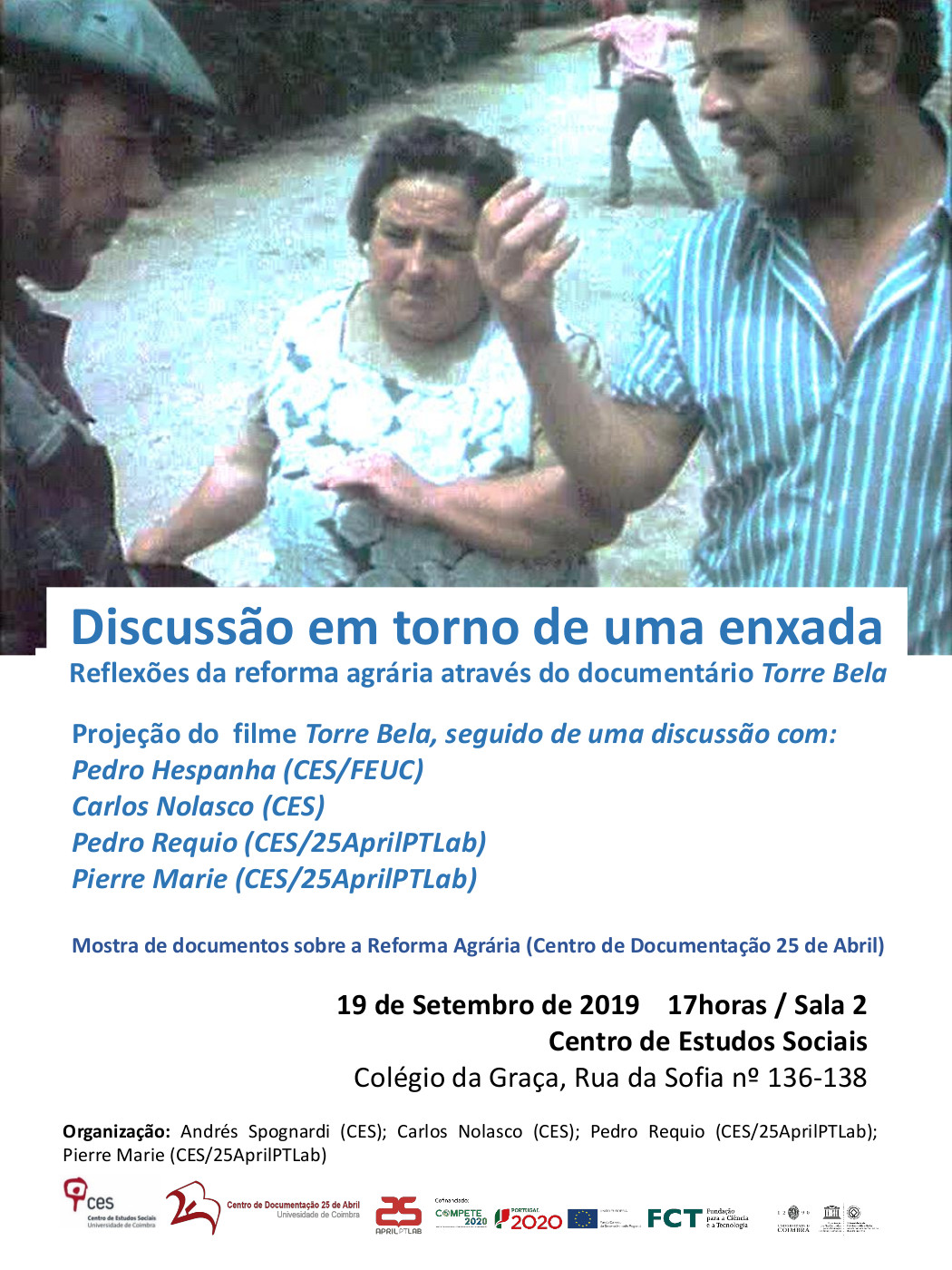Seminar
Discussing a hand hoe: Reflections on land reform through the documentary Torre Bela
September 19, 2019, 17h00
Seminar Room (Floor 2), CES | Sofia
Comments: Carlos Nolasco, Pedro Hespanha, Pedro Réquio and Pierre Marie | Moderator: Andrés Spognardi
Summary
Na sequência do 25 de Abril de 1974 e da revolução em curso, iniciou-se no sul do país a ocupação de terras num processo de Reforma Agrária. Rapidamente o espaço do latifundismo foi substituído por unidades coletivas de produção, e por todas as dinâmicas políticas e sociais que lhe estão associadas. Em face da ausência de uma cultura cooperativista, e perante persistentes ataques políticos, o processo rapidamente revelou incongruências entre uma ideologia coletivsta e o individualismo dos atores, entre uma dinâmica política ao centro e uma outra de esquerda, entre o texto constitucional e à prática governativa. Em 1977 começam as entregas das primeiras reservas aos antigos proprietários e começa a desvanecer-se o sonho de um efetivo modelo coletivsta de reforma agrária.
Torre Bela é o filme, documentário, que retrata essa ascensão e queda do processo de reforma agrária em Portugal. O filme inicia-se a 23 de abril de 1975, uma terça-feira, e termina a 7 de junho desse mesmo ano, uma sexta-feira. Durante esses quase três meses, vemos emoção, esperança, intervenção, acão, e depois, como que o prenúncio do fim, frustração e cansaço. Mas vemos mais coisas: um Portugal rural, saído dum regime de 48 anos de autoritarismo, que de repente grita a terra é de quem a trabalha, que fala em coletivismo e comunismo; um Portugal que inicia o seu processo de democratização, e que aqui mostra o rosto encantado da utopia em contradição com as contingências da realidade. Torre Bela é um filme de Thomas Harlan, realizado nos campos do Ribatejo, e que esteve presente em Cannes, na secção oficial, em 1977, sobre homens e mulheres, operários agrícolas, desapossados de terra, que ocuparam a propriedade do Duque de Lafões e criaram uma unidade coletiva de produção.
Este seminário está estruturado em duas partes: na primeira será projetado o documentário Torre Bela, de Thomas Harlan; na segunda, haverá uma mesa redonda de discussão e debate aberto ao público.
The 25th of April 1974 and the ongoing revolution, gave way to land occupation in the south of the country under a Land Reform process. Landlordism was quickly replaced by collective units of production, and by all the associated political and social dynamics. Faced with the absence of a cooperative culture, and given the persistent political attacks, the process quickly revealed inconsistencies between a collective ideology and the individualism of the actors, between one political dynamic at the centre and another on the left , between the constitutional text and governing practice. In 1977 renditions of the first reserves to former owners began and the dream of an effective collective model of land reform began to fade.
Torre Bela is the film, documentary, that portrays this rise and fall of the land reform process in Portugal. The film begins on April 23, 1975, a Tuesday, and ends June 7 of that same year, a Friday. During these almost three months, we see emotion, hope, intervention, action, and then, as a foreshadowing of the end, frustration and tiredness. But we see more things: a rural Portugal, emerging from a regime of 48 years of authoritarianism, who suddenly shouts land belongs to those who work it, who speaks of collectivism and communism; a Portugal that begins its democratisation process, and which here shows the enchanted face of utopia in contradiction with the contingencies of reality. Torre Bela is a Thomas Harlan film, made in the fields of Ribatejo, featured at Cannes official section in 1977, about men and women, landless farm workers, who occupied the property of the Duke of Lafões and created a collective unit of production.
This seminar is structured in two parts: the first one will be the screening of the documentary Torre Bela, by Thomas Harlan; In the second, there will be a roundtable discussion and a Q&A.
Organisers: Andrés Spognardi and Carlos Nolasco (CES), Pedro Réquio and Pierre Marie (CES /CD 25 de Abril)


